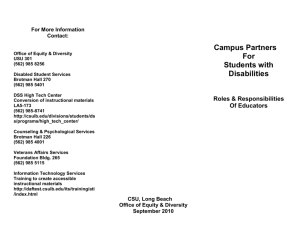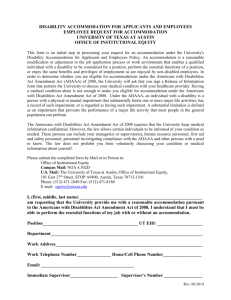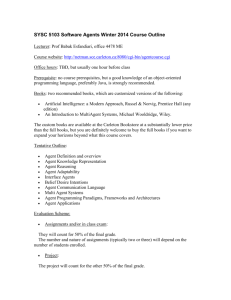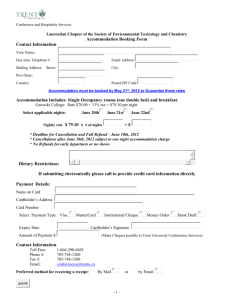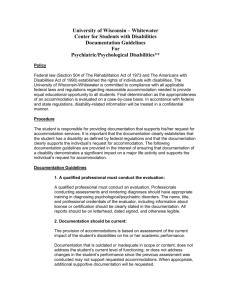The Job Search, Accommodation and Beyond.
advertisement
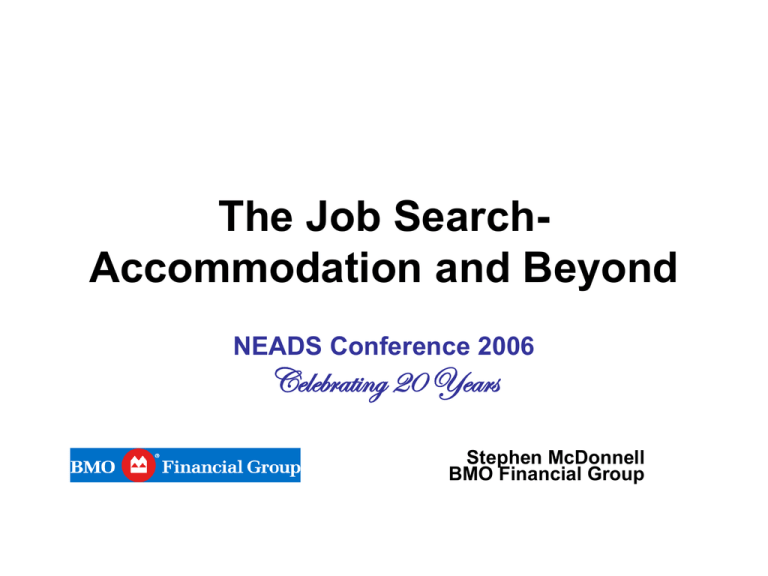
The Job SearchAccommodation and Beyond NEADS Conference 2006 Celebrating 20 Years Stephen McDonnell BMO Financial Group Equity Through Education The Equity Through Education charitable program was launched by BMO Capital Markets in 2005 to support the notion that gaining an education is a means of improving lives. Funds raised through Equity Through Education are donated to charitable organizations whose mission includes improving access to education and training for bright, deserving people who otherwise might not have the opportunity. To date, Equity Through Education has raised $3.2 million. Corporate Values We care about our customers, shareholders, communities and each other. We draw our strength from the diversity of our people and our businesses. We insist upon respect for everyone and encourage all to have a voice. We keep our promises and stand accountable for our every action. We share information, learn and innovate to create consistently superior customer experiences. The Job Search – A New Direction Top reasons for diversity according to 126 top U.S. and Canadian companies and firms: 24% Increasing competitiveness in attracting talent 19% Improving financial performance 14% Changing workforce demographics 11% Ensuring compliance with legal requirements Becoming more socially responsible Source: 2005 Catalyst Member Benchmarking Report 43% 37% 14% Increasing understanding of and/or access to specific markets, clients or consumer segments Increasing innovation effectiveness 73% 7% 2% 52% 21% 36% Number one Reason Top Three Reasons 12% Diversity and Inclusion Have Become More Important Talent – inclusive companies are better able to attract and retain diverse talent Market – inclusive companies are better able to scan and respond to their marketplace Decision-making – diverse teams, when properly managed, engage in a stronger decision-making process Companies with more women in senior management outperform companies with few women in senior management ROE 35% higher TRS 34% higher Source: The Bottom Line: Connecting Corporate Performance and Gender Diversity, Catalyst, 2004 THE MARKETPLACE ARGUMENT Anticipate and Respond to Customers Companies that leverage diversity and “mirror the market” will attract new customers and find new markets… Group Purchasing Power Women Control more than 80% of consumer and household spending (1) Visible Minorities (Canada) $76 billion (2) Persons With Disabilities $25 billion (3) (Canada) Aboriginal People $24 billion (4) (Canada) GLBT (U.S.) $610 billion in 2005 (6) Source: 1 The 80% Minority, Joanne Thomas Yaccato, 2003 and Quick Facts – Buying Power, Catalyst 2 A Business Case for Diversity, Dr. Jeffrey Gandtz, University of Western Ontario, Fall 2001, HRSDC) 3 The Impact of Employment Equity on Corporate Success in Canada, Kimberley Bachmann, March 2003 4 The Aboriginal Population: The Current and Future State, Clint Davis, July 13, 2006 6 Buying for Equality, Human Rights Campaign, March 2006 THE TALENT ARGUMENT Diversity is a Powerful Magnet for Recruitment The changing age demographics of the labour force argue for better understanding and mirroring diverse groups… Canada U.S. • 6.7 million baby boomers • By 2012, the labour force will exit the workforce by 20211 be comprised of3: • Generation Y – 5.6 million2 Workers ages 16-24 = 15% Workers ages 25-54 = 66 % Workers ages 55 and older = 19% Canada’s Aging Population © Minister of Public Works and Government Services Canada, 2002 Welcoming Y Benefits Canada, 2004 3 Mitra Toosi, “Labor force projections to 2012: the graying of the U.S. workforce,” Monthly Labor Review, February 2004. 1 2 Accommodation The duty to accommodate is a requirement of both the Canadian Human Rights and Employment Equity Acts Includes factors such as disability, sex, age, family status ethnic origin and religious belief Must be provided short of ‘undue hardship’ application of undue hardship applies to enterprise not unit Supreme Court accepts considerable measure of hardship must be anticipated in ensuring accommodation Positive Outcomes/Business case Increase shareholder value through accessible service for all. Enhance public image as leaders in inclusion. Recruit and retain top talent. Serve as a model for external corporations and agencies. Ensure a motivated, healthy and productive work environment. Expand market to attract more customers with disabilities. Workplace Accommodation Accommodation is the obligation to eliminate disadvantage Applies during recruitment, selection, training, career development, and ongoing employment Employment decisions must not be impacted by the need to provide accommodation Recognizes that each employee is unique and responds to each person’s needs Respects the dignity and privacy of the individual Does not diminish the individual’s responsibility to do essential job functions Types of Employment Accommodation For employees with disabilities: •Physical adaptations •Human support •Job modification •Adaptive Technology •Policy and systems •Flexible work arrangements •Scheduling Getting it Right with Colleagues Accommodation is a joint responsibility No two accommodations are the same Accommodation is not absolute • May involve technology and human support • May evolve as technology and/or conditions change Staying in Touch Mentoring Opportunities at BMO Financial Group “Connecting You to a Brighter Future” Staying in Touch A new and exciting opportunity inviting college and university students with disabilities mentoring opportunities with employees of BMO Financial Group

